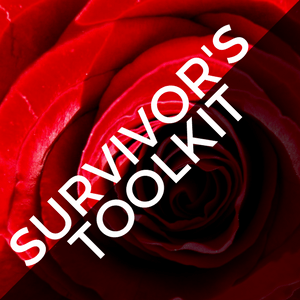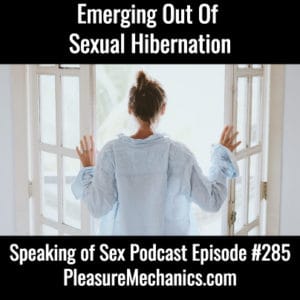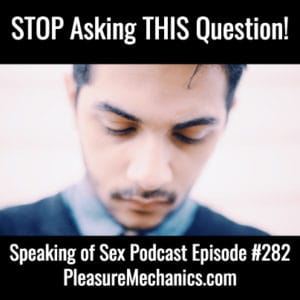Podcast: Play in new window | Download

Can writing be a tool to unlock more erotic freedom and possibility? How does reading erotica help us discover what is possible for our own sex lives?
In this interview, writer and writing workshop facilitator Jen Cross shares what she has learned from over 20 years guiding others in tapping into the power of writing as a creative and generative practice.
This interview is for everyone – whether or not you identify as a writer, whether or not you identify as a survivor of sexual trauma.
Part 2 of the interview dives deeper into writing as a practice for working with sexual trauma, and can be found in our new Survivor’s Toolkit, a free online resource for all survivors of sexual trauma.
Check out Jen Cross’ book Writing Ourselves Whole: Using The Power Of Your Own Creativity To Recover And Heal From Sexual Trauma
Learn more about the Writing Ourselves Whole writing workshops and other offerings here.
Jen Cross on the power of writing about sex : excerpt from Writing Ourselves Whole
An excerpt from “writing the delicious stories” in Writing Ourselves Whole: Using the Power of Your Own Creativity to Recover and Heal from Sexual Trauma (Mango, 2017)
When I started writing on my own, when I was coming out as both an incest survivor and a queer woman, I did a lot of writing about sex. (A lot of writing about sex.) Not quite ten years later, when I started leading writing groups with other trauma survivors, I was still curious about how we found words for our want: What stories do we tell about our desire, about what was ok to long for and what wasn’t? What did it mean, what did we mean, as survivors of sexual trauma who wanted to have good sex?
My initial impetus for the erotic writing groups for sexual trauma survivors was to create a space where survivors of sexual violence could express their full, lived, complicated, and consensual sexuality—a sexuality that was, explicitly, at the intersection of trauma and desire. This would be a space where we could acknowledge the trauma embedded in our sex, even if we never wrote about the trauma/violence itself. These were groups where we wrote sexual fantasy about fictional characters and read them aloud to people who understood how dangerous and revolutionary it was for us to entertain the idea of a fun or silly or “light” sexual fantasy. What did we think we were doing, sitting in molded plastic chairs in a room with painted concrete walls and writing in public about having sex? Didn’t we know it would be safer to keep these things quiet, to put them still unworded back in our bodies?
During those eight weeks of my first writing group, in the summer of 2002, something in each of us writers softened, as, week after week, we allowed ourselves to risk writing what we really wanted, out of our particular healing and desiring humanity. In these groups, our definition of “erotic” was expansive, after Audre Lorde’s definition in her essay “Uses of the Erotic”: the erotic as a site of our grounded and embodied power, our profound creative fullness. When we write from that place, we write from and with our breath, our bodies, our whole human experience. Each word passed through our musculature, our bones, our veins, from head through body to page. Through this writing, we practiced trust for and gratitude toward our bodies. We restoryed an eros that had been desecrated.
Then something surprising happened: the women I wrote with began to write about desires other than sex. Each of us in that room wanted more, better, more connected, more healed sex, of course; we also wanted to write books or paint pictures or make music or find more satisfactory work. Articulating any longing—having it witnessed and held—creates space for all of our longings to begin to shuffle around and ask for the attention they’ve been denied. Each of the writers in that survivors erotic writing group started to pursue not just sex that was more true to our actual desire, but more of what we wanted outside the bedroom, too. We wanted more joy, in all parts of our lives.
Turns out, hunger is hunger is hunger. Desire is desire. In America, we’ve tried to confine eros to the sexual realm, because we think we can contain and control it that way, but eros is bigger than deep and authentic sexual connection (which, itself, is pretty damn big, whether with someone you’ve just met or with a long-time lover). Eros is embodied power. Eros is our longing for realization, for fulfillment. Eros is our creative expression. In “Uses of the Erotic,” Audre Lorde wrote, “We have been raised to fear the yes within ourselves, our deepest cravings. But, once recognized, those which do not enhance our future lose their power and can be altered. The fear of our deepest cravings keeps them suspect and indiscriminately powerful, for to suppress any truth is to give it strength beyond endurance.
Early on in my sex-writing practice, I was able to get around my triggers and trauma aftermath because I wrote fiction. I wasn’t writing myself—exactly. Instead, I sat behind my character’s eyes and came in through the back door, as it were, to the safety and power of my sexual self. I found solidarity with my characters: the sex they wanted that they were afraid to admit, their struggles to break through the confines of particular identities. I was able write a home for their desire, and, in so doing, without having to admit it directly, wrote a home for one more piece of my own sexuality.
There have been times when writing about sex in and of itself was sexual, was sex, for me. Erotic writing can bring me into the heart of my own sex, into my power and fear and lust and longing. This writing is a means through which I continue to heal myself: when my body feels broken and unredeemable, when I am afraid that I will never again be wildly and joyfully sexual, I remind myself that at least I am wildly and joyfully sexual when I write (or, anyway, I can write characters who are).
Writing about sex is rarely triggering for me—I know that isn’t true for everybody. In my experience, there’s something powerful about the one-step-removed, the I’m just writing this down, I don’t have to do it, the this is someone else’s fantasy and life I’m stepping into right now. There’s something powerful in writing another’s desire, taking this character and asking, Ok, what happens now if we try this? And I get to see what it’s like for her, and wonder (maybe, sometimes, I let myself wonder), Would it be like this if I tried it myself? Other times it’s enough to follow this character into all her desire and her risk and bravery and fear and shame and orgasms (or not) and feel all that possibility move through my body as I write.




